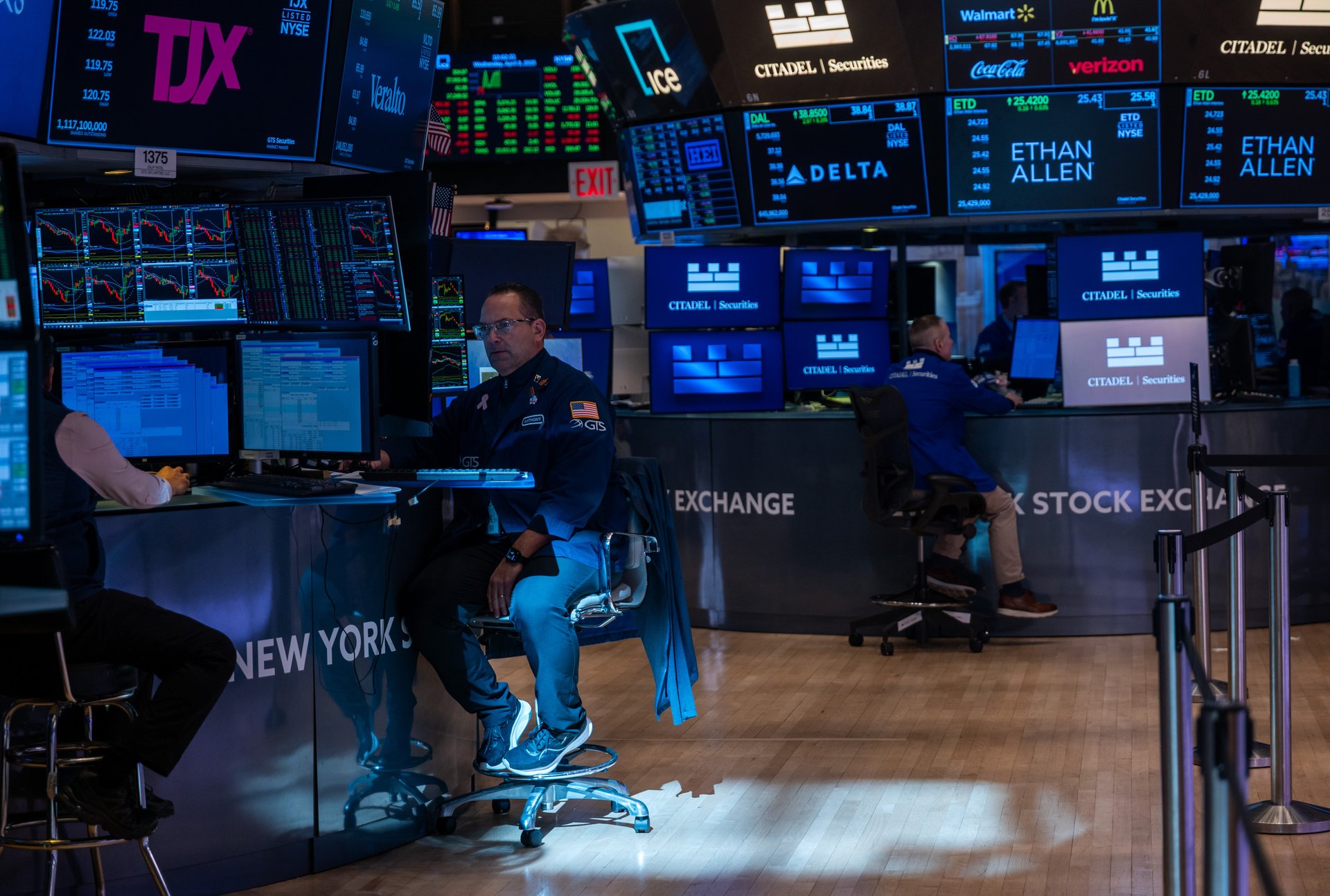The Dow soars 3,000 points as Trump suddenly hits pause on most tariffs
Markets rallied even as President Trump said he would raise the tariff rate on China to 125%

U.S. market indexes shot up Wednesday afternoon after President Donald Trump announced a 90-day pause on tariffs for most countries.
Suggested Reading
“Based on the fact that more than 75 Countries have called Representatives of the United States” to negotiate the tariffs, Trump posted on his Truth Social platform, “I have authorized a 90 day PAUSE, and a substantially lowered Reciprocal Tariff during this period, of 10% ... effective immediately.”
Related Content
The tech-heavy Nasdaq ended the day up 1,857 points (12.2%). The Dow Jones Industrial Average rose 2,963 points (7.9%) on the day, while the S&P climbed 474 points (9.5%).
In the same post, Trump announced that he was raising the tariff rate on China from 104% to 125% “effective immediately.”
China had announced retaliatory tariffs on U.S. imports earlier in the day. The total levy implemented by Beijing, which went into effect at noon ET on Wednesday, comes out to 84%.
Trump wrote in his post that the decision to increase the tariffs on China was due to a “lack of respect that China has shown to the World’s Markets.”
He wrote, “At some point, hopefully in the near future, China will realize that the days of ripping off the U.S.A., and other Countries, is no longer sustainable or acceptable.”
China wasn’t alone in retaliating against Trump’s tariffs. The EU voted Wednesday morning to place tariffs on U.S. imports, including manufactured goods and farm products such as soybeans, according to the New York Times. The tariffs would range from 10% to 25% and would go into effect April 15.
The stock market’s sharp climb Wednesday comes after four straight days of losses. Stocks suffered a steep sell-off Tuesday, when the S&P 500 fell 1.6%, the Dow Jones Industrial Average dropped nearly 1%, and the Nasdaq Composite slid 2.1%. Monday featured the highest trading volume in three years.
Treasury Secretary Scott Bessent said Wednesday that the tariff pause was not in response to recent market volatility, according to a Bloomberg reporter.
Gold jumped 3% on Wednesday, typically a sign of investors moving to lower-risk assets.
Long-term outlook remains uncertain
Despite Wednesday’s rally, long-term fears remain. The constant whiplash on tariffs has led to volatility and uncertainty in the market.
Earlier Wednesday, Walmart (WMT) scrapped its first-quarter operating income guidance, citing a lack of long-term clarity around tariffs. Bloomberg reported that Amazon (AMZN) had started quietly canceling some wholesale orders from Asia.
A dramatic sell-off in government bonds pushed the 30-year yield above 4.75%, its highest level since February, as fears mounted that tariffs could fuel inflation rather than cool the economy.
“If Trump’s secret agenda is to crash the stock market to bring down long-term interest rates, the plan already failed,” economist Peter Schiff posted on X. “The plan to crash the stock market is now crashing the bond market too.”
Thomas Lee, a managing partner and the head of research at Fundstrat Global Advisors, sent a memo Wednesday saying that many macro fund managers he’s spoken with wonder whether Trump “might be insane.”
Lee wrote that if tariffs stay in place for an extended period, it would result in the government effectively “freezing” the economy. Then, companies would be so pummeled by the tariffs that the “shock” to the economy would ripple, leading to a cascade of slowing economic activity and the very real risk of a recession.
Eyes on economic data and Delta Air Lines earnings
A report from the U.S. Census Bureau on February’s wholesale trade sales and inventories is due Wednesday, which could provide clues about inventory buildups and downstream economic softness. Any signs of weakening wholesale activity could reinforce concerns about the economy’s resilience in the face of rising geopolitical tensions and delayed Fed rate cuts.
Delta Air Lines (DAL) reported its earnings Wednesday, forecasting second-quarter revenue to decline up to 2% or grow as much as 2% over last year. Analysts had expected growth of 1.9%. CEO Ed Bastian referred to Trump’s trade policies as “the wrong approach” and said bookings were down because of declining markets, decreased business travel, and a shrinking government workforce.
Bastian had previously said he expected 2025 to be the “best financial year in our history,” but that was before the market chaos of the past month.
Delta is seen as an early bellwether for first-quarter travel results. Its stock was up 21.7% on Wednesday but remains down 26% year-to-date.
—Kevin Williams contributed to this report.